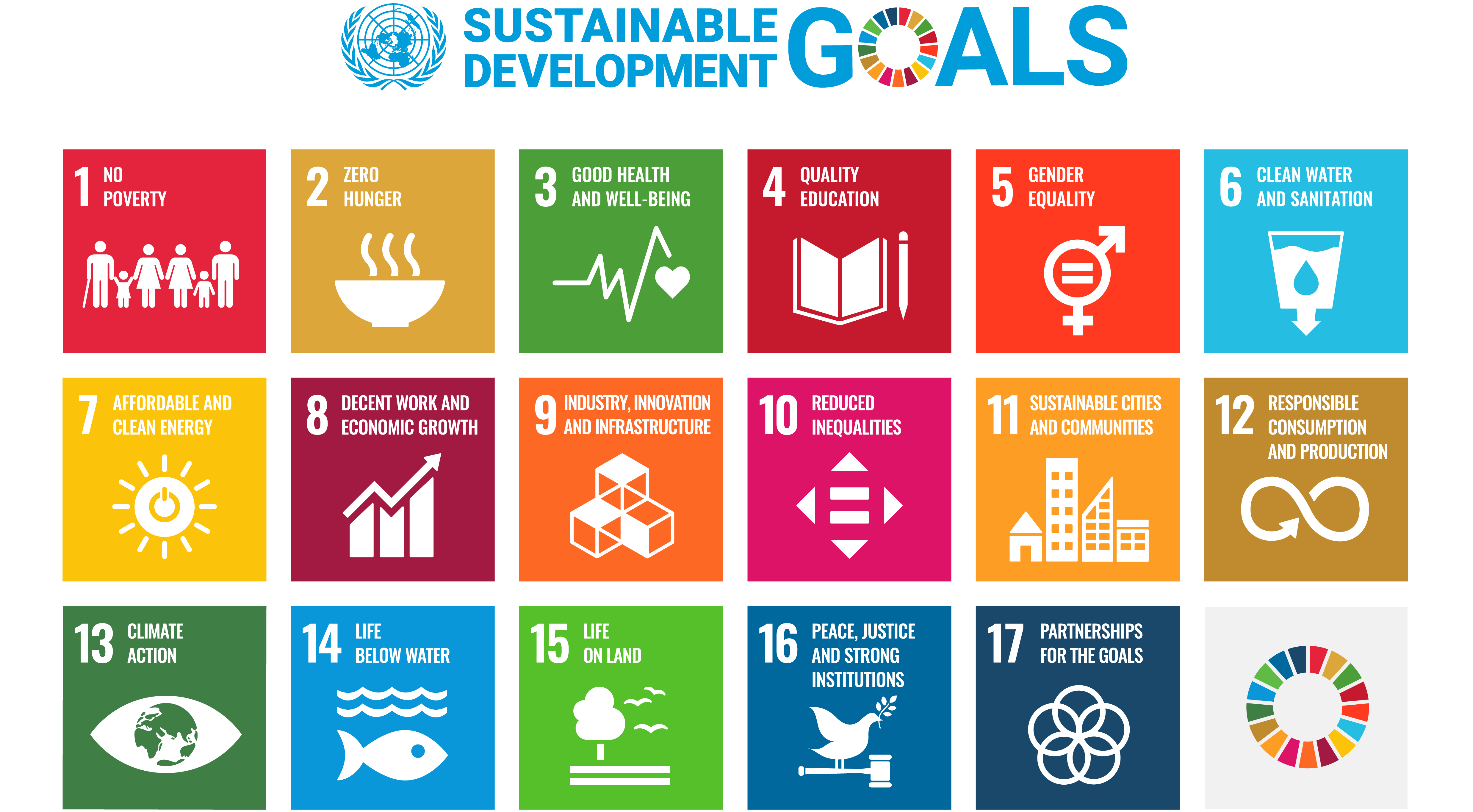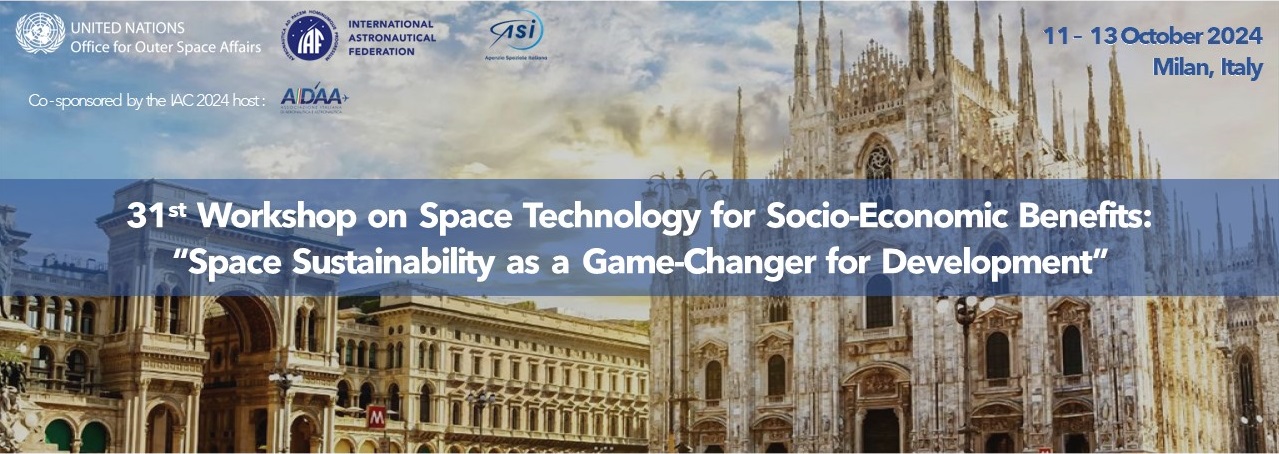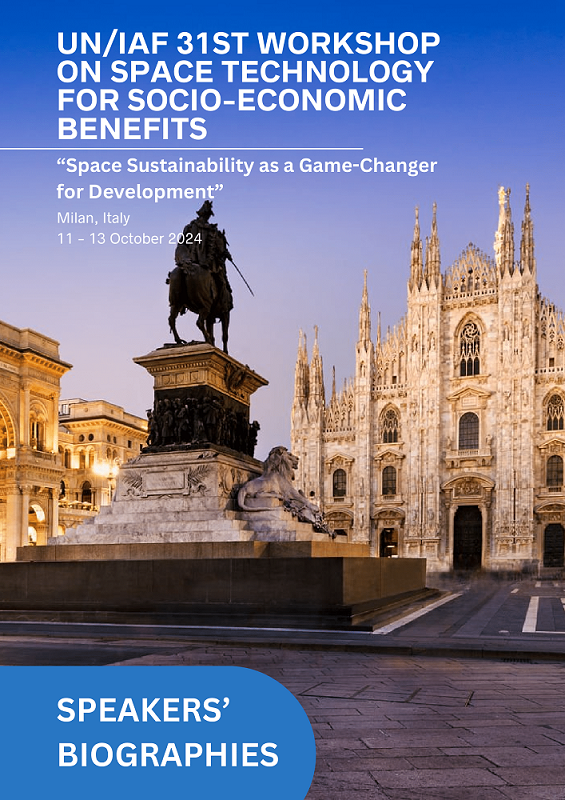31st Workshop on Space Technology for Socio-Economic Benefits:
"Space Sustainability as a Game-Changer for Development"
In partnership with the International Astronautical Federation (IAF)
and in cooperation with the Government of the Italian Republic
at MICO Convention Centre, Milan, Italy, on 11 - 13 October 2024
in conjunction with the 75th International Astronautical Congress hosted by
the Italian Association of Aeronautics and Astronautics (AIDAA)
(Update on 25 October) The bios of the speakers are available online, please download the
booklet.
(Update on 1 October) The programme has been updated.
(Update on 20 June) Registration is closed and the workshop is full.
INTRODUCTION
The United Nations, through its Programme on Space Applications implemented by the United Nations Office for Outer Space Affairs (UNOOSA), and the International Astronautical Federation (IAF) are co-organizing the Workshop on Space Technology for Socio-Economic Benefits on the theme "Space Sustainability as a Game-Changer for Development."
The workshop takes place at the venue of the 75th International Astronautical Congress (IAC) and the theme of the Workshop is aligned with the theme of the Congress: "Responsible Space for Sustainability."
The purpose of the Workshop is to bring together people from either government, space agencies, research institutes, academia, or non-governmental organizations who prepare and carry out space activities and are specifically interested in making space activities sustainable, so that their benefits on Earth will continue to be provided to future generations. Those who are interested in building partnerships, notably to raise awareness of initiatives about sustainability of the space environment or capacity building activities about reducing the impact of the space industry on the Earth environment are also particularly welcome to participate.
The Workshop will be hosted by the Italian Space Agency (ASI), and held in Milan, Italy, from 11 to 13 October 2024.
WORKSHOP OBJECTIVES

Space applications are a game-changer in many sectors of the economy, and they have revolutionised the way services essential for socio-economic development are provided in many areas, from agriculture to transport or telecommunications. However, for these benefits to remain available, space activities themselves need to be sustainable. The concept of sustainability will be addressed from several angles, looking at how to ensure that activities in space will remain feasible for all stakeholders in the long-term despite the strong increase of the number of objects in Earth orbit, looking at how to make the space industry itself more aligned with environmental concerns on Earth, and looking at how space-based tools are essential enabler for sustainability initiatives on Earth.
The Workshop will provide a platform for discussion about how to increase capabilities in a sustainable way, explore innovative technologies and approaches to reduce the contribution of the space industry itself to the climate crisis, and increase awareness of technical means to improve the long-term sustainability of outer space activities. The Workshop will provide a platform for discussion about technical solutions already in use so that the benefits that space activities offer remain available in a wide range of applications. The main objectives of the Workshop are to:
- Raise awareness of the various initiative to measure and predict the impact of space activities (spacecraft manufacturing, launch and re-entry) on the Earth environment;
- Showcase changes in space engineering practices to reduce the carbon footprint of the space sector overall, with technical innovations for greener technologies, financing of innovations and regulatory incentives for their adoption;
- Capacity building activities on space sustainability, especially from the perspective of new space faring countries and non-space faring countries keen to adopt best practices and preserve the sustainability of the space environment;
- Share challenges and success stories to de-orbit spacecraft responsibly, such as technical de-orbiting methods and tools, to discuss what methods are the most effective;
- Showcase success stories of technical coordination for space activities that have been impacting each other, such as astronomical observations and satellites operations, or activities of various nature on the surface of the Moon and Mars
- Share information on innovative space-based applications and services contributing to environmental sustainability on Earth.
Presentations made during the Workshop will be published on the website of the Office for Outer Space Affairs, while the report of the Workshop and its recommendations will be distributed to the participants and to the UN Committee on the Peaceful Uses of Outer Space.
PROGRAMME (Update on 1 October)
| DAY 1: Friday 11 October 2024 | ||
| 09:00 - 10:00 | Registration and refreshments | |
| 10:00 - 10:15 | Opening ceremony | |
| Aarti Holla-Maini | Director, United Nations Office for Outer Space Affairs (UNOOSA) | |
| Clay Mowry | President, International Astronautical Federation (IAF) | |
| H.E. Debora Lepre | Permanent Representative of Italy to the International Organizations in Vienna | |
| 10:15 - 10:45 | Setting the scene | |
| Nathalie Ricard | Scientific Affairs Officer, UNOOSA | |
| Christian Feichtinger | Executive Director, IAF | |
| Teodoro Valente | President, Italian Space Agency (ASI) | |
| Erasmo Carrera | President, Italian Association of Aeronautics and Astronautics (AIDAA) | |
| Masami Onoda | IAF Committee for Liaison with International Organisations and Developing Nations (IAF CLIODN) | |
| Matías Campos Abad | IAF Committee on Connecting Emerging Space ecoSystems (IAF ACCESS) | |
| 10:45 - 11:00 | Group photo | |
| 11:00 - 12:00 |
Session 1: Assessing and reducing the impact of space activities on the environment
|
|
| Environmental impacts throughout a satellite megaconstellation lifecycle | Samantha Lawler, Outer Space Institute and University of Regina, Canada | |
| Remove before launch space debris accumulation on Point Nemo and Antarctic ecosystems | Victoria Fernanda Valdivia Cerda, Academia Nacional de Estudios Políticos y Estratégicos (ANEPE), Chile | |
| Sustainable data practices in climate research | Ryan John McCall Laird, Green Orbit Digital, United Kingdom | |
| The polluting potential of space debris demise in the atmosphere: the case of aluminum | José Pedro Ferreira, Portugal, University of Southern California, USA | |
| Dark and quiet sky: a wake-up call for the New Space Economy | Piero Benvenuti, Italy, International Astronomical Union Centre for the Protection of the Dark and Quiet Sky from Satellite Constellation Interference | |
| 12:00 - 13:00 | Lunch break | |
| 13:00 - 13:15 | Project pitch | |
|
- Lisa Vitaris, Space Industry Association of Australia
|
||
| 13:15 - 14:15 |
Panel 1: Solutions to reduce the environmental impact of space activities
|
|
|
- Guia Pastorini, Leonardo, Italy
|
||
| 14:15 - 14:45 | Coffee break | |
| 14:45 - 15:00 | Project pitch | |
|
- Florent Morice Mtuka, Ministry of Information, Communication and Information Technology, Tanzania
|
||
| 15:00 - 16:15 |
Panel 2: Legal best practices for space sustainability
|
|
|
- Lulekwa Makapela, National Earth Observations and Space Secretariat (NEOSS), South Africa
|
||
| 16:15 - 17:30 | Networking | |
| Day 2: Saturday 12 October 2024 | ||
| 09:00 - 10:00 | Registration and refreshments | |
| 10:00 - 10:15 | Keynote "The Dark Side of Space: addressing the space debris crisis" by A.K. Anil Kumar, IAF Vice President for Relations with International Organizations | |
| 10:15 - 11:30 |
Session 2: Space situational awareness and collision avoidance
|
|
| Space traffic coordination for sustainability | Richard DalBello, NOAA Office of Space Commerce, USA | |
| Ecosmic: on a mission to scale satellites' software infrastructure | Benedetta Margrethe Cattani, Ecosmic, Italy | |
| Empowering SSA: policy solutions | Geetanjali Ramanand Kamat, Digantara Research and Technologies Private Limited, India | |
| Investigation and modeling of space weather effect on space-based objects for orbital sustainability in low Earth orbit | Victor Uchenna Jonathan Nwankwo, Nigeria, German Aerospace Center (DLR), Germany | |
| Development of the national SSA system | Gulnara Omarova, Fesenkov Astrophysical Institute, Kazakhstan | |
| 11:30 - 12:30 |
Panel 3: Manufacturing and recycling in space
|
|
|
- Nieves Cubo Mateo, Nebrija University, Spain
|
||
| 12:30 - 13:30 | Lunch break | |
| 13:30 - 13:40 | Project pitch | |
| - Mamonaheng Koenane, Impact School, Lesotho | ||
| 13:40 - 14:55 |
Session 3: Capacity building and raising awareness
|
|
| Capacity building in space capabilities for national and regional benefit: lessons learned | Roman Alexander da Silva Curiel, Surrey Satellite Technology Ltd., The Netherlands | |
| Capacity building for space sustainability in the Maldives | Aya Hesham, Egypt, SigmaFIt LLC and the Maldivian Space Research Organization | |
| Outreach and capacity building for sustainable space development: insights from Benin's experience | Prudence Ayivi, Space Generation Advisory Council, Benin | |
| Leveraging space enablers for capacity building and sustainable space development | Emeline Paat-Dahlstrom, the Philippines, SpaceBase, New Zealand | |
| Japan's contribution to the SDGs through KiboCUBE programme | Hiroki Akagi, Japan Aerospace Exploration Agency (JAXA), Japan | |
| 14:55 - 15:15 | Project pitch | |
|
- Afiq Herdika Sulistya, Surya Satellite-1 Project Team, Indonesia
|
||
| 15:15 - 15:45 | Coffee break | |
| 15:45 - 16:00 | Project pitch | |
|
- Abdalla Shaker Tawfik Abdalla, Egyptian Space agency
|
||
| 16:00 - 16:20 | Keynote "ASI Earth Observation contribution to sustainability: an overview" by Teodoro Valente, President, ASI | |
| 16:20 - 18:00 | Networking | |
| 18:00 - 20:00 |
Reception
|
|
| Day 3: Sunday 13 October 2024 | ||
| 09:00 - 10:00 | Registration and refreshments | |
| 10:00 - 10:10 | Keynote "Towards a Zero Debris future" by Quentin Verspieren, European Space Agency (ESA) | |
| 10:10 - 10:45 |
Session 4: Space applications for sustainability on Earth
|
|
| Dragonfly | Sirikul Hutasavi, Geo-Informatics and Space Technology Development Agency (GISTDA), Thailand | |
| Using integrated GEO and LEO orbit satellite data in on-grid solar power potential site selection in Vietnam | Nguyen Tien Cong, Vietnam National Space Center, Vietnam | |
| Adoption of communication satellites in south Sudan to bridge the digital divide | Zamba Leonel, South Sudan National Communication Authority, South Sudan | |
| 10:45 - 10:55 | Project pitch | |
|
- Camila Erazo Gonzalez, Youth leader at Colombian space agency/Lab & Law International Trade, Colombia
|
||
| 10:55 - 11:40 |
Panel 4: Space applications for sustainability on Earth
|
|
|
- Rodrigo da Costa, Executive Director, EU Agency for the Space Programme (EUSPA)
|
||
| 11:40 - 12:00 | Wrap-up | |
| 12:00 - 12:15 | Closing ceremony | |
| Pilar Zamora | IAF Vice President for Developing Countries and Emerging Communities | |
| Aarti Holla-Maini | Director, UNOOSA | |
| Alfonso Pagani | AIDAA and IAC-2024 International Program Committee Co-Chair | |
| 12:15 - 12:30 | Group photo | |
| 12:30 | End of the workshop | |
| 12:30 - 13:30 | Lunch | |
Download
Call for Abstracts (Update on 28 June)
The call for abstracts has been closed since 9 June 2024.
Selected speakers have been informed.
Registration as self-funded attendee has been closed since 20 June 2024.
Selected attendees have been informed. The workshop is full.
WORKING LANGUAGE
The working language of the Workshop will be
English.
All participants are required to have good English language skills.
SPONSORSHIP
UNOOSA and the IAF are responsible for organizing the Workshop. Sponsorship of the workshop is still open to interested entities who may contact UNOOSA at unoosa-events@un.org.
EXPECTED PARTICIPANTS
The Workshop is being planned for a total of 150 participants. They include technical experts, innovators, educators, policy- and decision-makers from international, regional, national and local institutions, United Nations agencies, intergovernmental and non-governmental organizations, research and development institutions, and also from industry.
Participants will be selected up to the maximum capacity of the room, based on relevant professional and/or academic experience.
FINANCIAL SUPPORT
Within the limited financial resources available, UNOOSA may provide funding for individuals selected as a speaker and whose nationality is classified as a developing country. They will be selected on a competitive basis, depending on their place of origin and relevant professional or educational background. For the list of developing countries, please refer to the annex of the "World Economic Situation and Prospects 2024" report, available at https://desapublications.un.org/publications/world-economic-situation-and-prospects-2024.
Please note that financial support will only be considered for applicants who submit an abstract that is retained in the programme for an oral presentation at the workshop.
LIFE AND HEALTH INSURANCE
Health insurance for each of the selected participants is necessary and is the responsibility of the person or his/her institution or Government. UNOOSA will not assume any responsibility for life and health insurance, nor for expenses related to medical treatment or accidents.
CONTACT INFORMATION
For additional information on the Workshop programme, please contact UNOOSA at unoosa-events@un.org.

